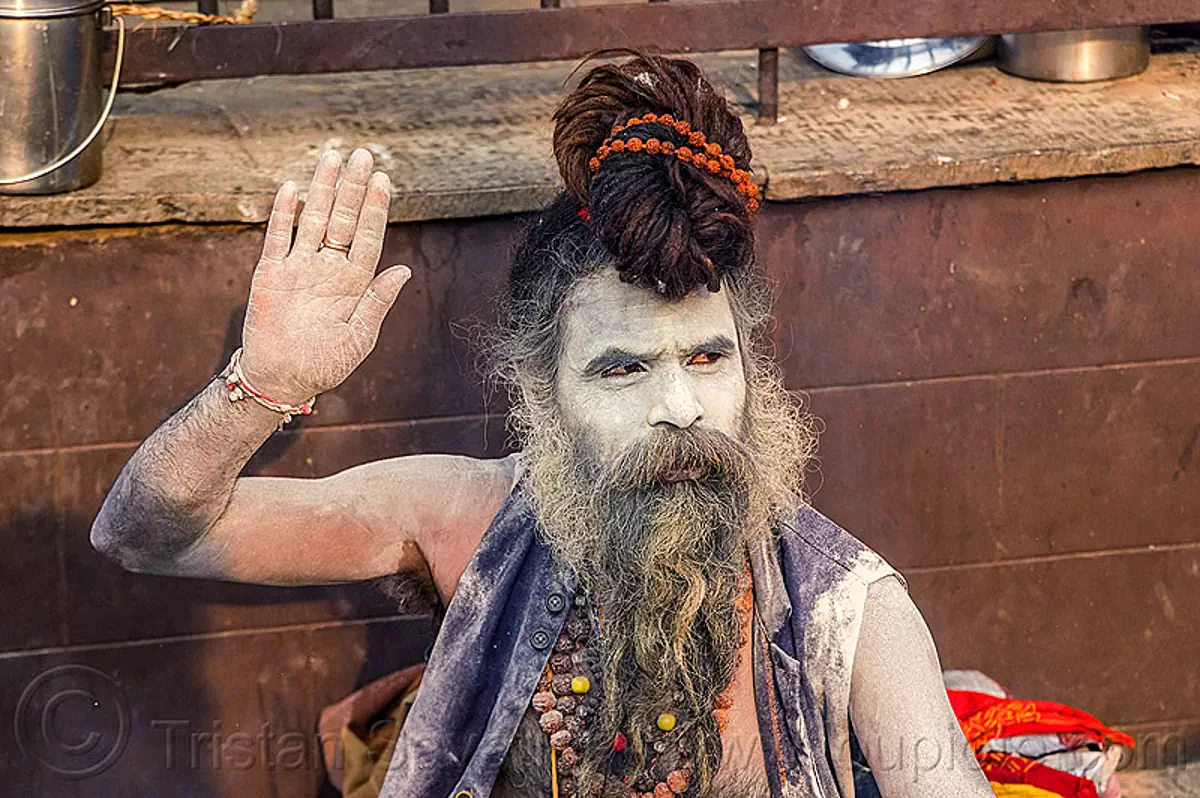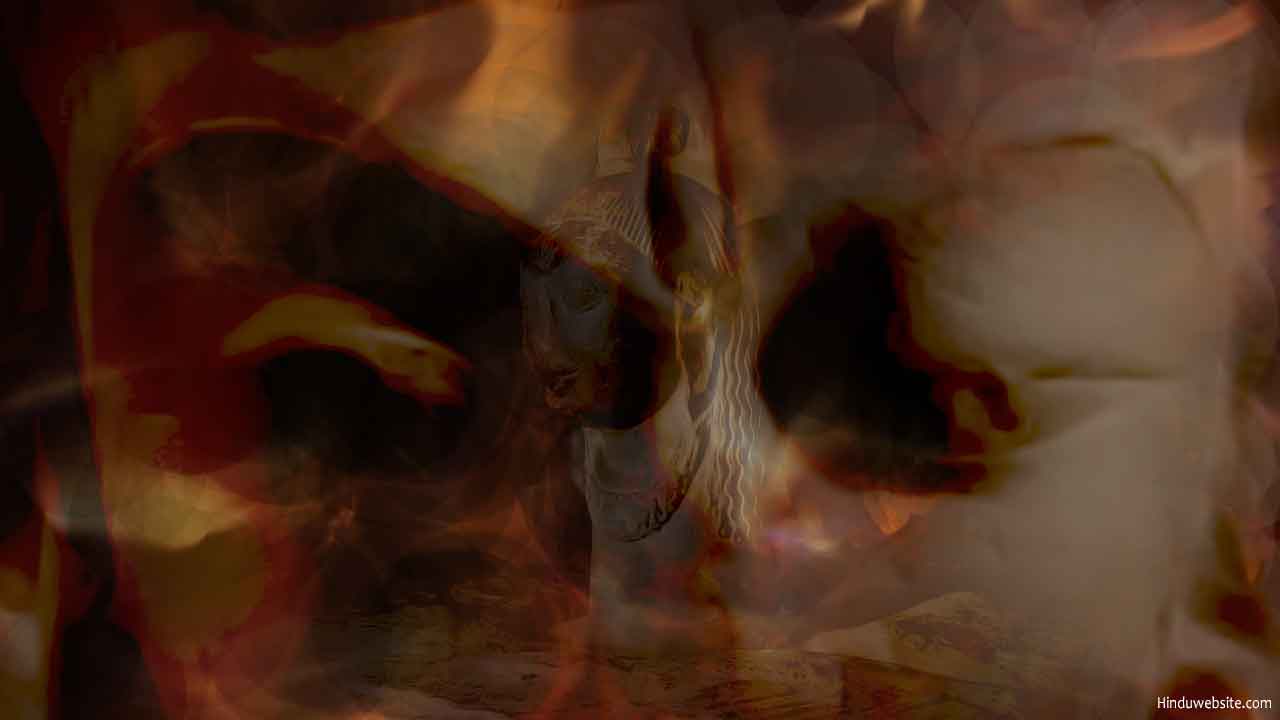No products in the cart.
In Hinduism, vibhuti, also called bhasma or thiruneeru, is a sacred ashes made of dried wood, burnt cow dung and / or burnt carcasses used in Agamic practices. Hindu devotees traditionally use the kibhuti as three horizontal lines on the forehead and other parts of the body in honor of Shiva. Vibhuti rubbed his forehead until he reached the end of both eyebrows called tripundra.
According to the Shiva Purana, ash particles attached to the skin when tripundra is used should be considered as individual lingams. The scriptures go on to say that the bhasma purifies the soul and elevates the devout person of Shiva, and that the activities performed without wearing the bhasma are fruitless. There are various ways of applying the ashes, according to the Shiva Purana, as well as the various mantras that must be recited during incorporation.
Another definition of vibhuti is the ‘glorious form’, in contrast to the avatar, the rebirth of Brahman.
.png?ext=.png)
Vibhuti ) is a word with several meanings in Hinduism. Generally, it is used to describe the sacred ashes made of dried wood burned in Vedic rites. Hindu devotees make a paste by mixing vibuti with water and using it as three horizontal lines on the forehead and other parts of the body to please King Shiva. Vibhuti who rubbed his forehead to the end of both eyebrows is called Tripundra. .
Description-
In Sanskrit, Bhooti means Aishwaryam, which means wealth, fortune, heritage. Vi-booth with Upasarga (preposition “vi”) means more or less important. The synonym for Vibhuti in Sanskrit as mentioned in Amara-kosha is “Vibhuti: bhoothi: Aishwaryam”. Vibhuti can also be called Boothi, Aishwaryam, Basma etc.,.
Holy ashes:
Vedic texts say “Lalaata Shoonyam Smashaana Tulyam”, meaning “empty forehead compared to graves”. Therefore, Hindus pay special attention to the fact that their foreheads are anointed and that they always rest on their bodies for a day. Even Almighty King Shiva, who plays the cymbal all the time, is an example to his followers that although a person is considered great in this mortal world, he needs to anoint his forehead and body with sacred ashes prepared in a special kind of wood. as he did (King Shiva) at the Immortal adobe of Kailasa. Therefore, it is considered by Vedic scholars that even the great saints, seers, yogis and the like should always wear boots on their foreheads and other body parts in the form of a three-dimensional triangle to make Tripundra. Vibhuti anointed horizontally to form three parallel lines with the forefinger, middle finger and ring on the forehead and other parts of the body such as the chest, abdomen, arms, elbows, wrists etc. It is called Tripundra. It is the duty of King Shiva devotees. to have Tripundra over their bodies at all times.
The great saint Thiru Gyaana Sambandar performed many miracles with Vibhuti and described the greatness of Vibhuti in one of his Pathigam called “Thirune Petro Pathigam” as follows:
Mandhira maavadhu neeru| Vaanavar meeladhu neeru ||
Sundhara maavadhu neeru |Thudhikkap paduvadhu neeru ||
Thandhira maavadhu neeru| Chamayaththil ullaadhu neeru ||
Senthuvar vaayumai pangan|Thiruaalavaayaan Thiruneerae ||
Meaning: Mantra is ashes; Higher than the heavenly beings are the ashes; Beauty is ashes; He is glorified by the ashes; Ashes strategy; In religion the ashes; The Thiruaalavaay King (King Sundareshwarar, Madurai) who shares the body with the red-lipped Parvathi – His Holy Ashes.
The eight great Vibhuthis of God
Vibhuthi is also used specifically to describe the great power (vibhthva) of God, who has the power to create, to support, to mislead, to expose and to disperse the worlds and creatures. It is said that there are eight kinds of omnipotence, manifest in human beings, in deities, and in all spiritual creation, divinity and purity.
From the beam are vibrations, glitter, light, light, energy, or an aura of perfection or greatness. Like light from a glorious sun, God’s power shines with great power to enlighten the earth and move on. The eight supernatural forces (vibhuthis) are listed below-
1.) The ability to be thin (animan)
2.) Ability to be overweight (laghiman)
3.) Ability to attract, obtain, gain(prapthi)
4.) Ability to fulfill desires or express desires (prakamyam)
5.) Power to grow in power, majesty, or greatness (mahiman)
6.) Power to exercise supreme, sovereignty, authority or omnipotence (ishitha)
7.) Power to measure, mislead, bewitch or rule (vasitha)
8.) Ability to control or suppress desires(kamavasiyatha)
Symbolism of Vibhuti
Vibutti also refers to the ashes of the burning of cow dung, cremation, or the remains or remnants of an object or offering made on the sacrificial fire (yajnasesham). In the latter sense, the boot has great significance in Hinduism, and especially in Shaivism, such as the symbol of purity, purity, karma, sacrificial sacrifice, imperfection, healing, protection and the power of sucking. Dedicated Hindus use the boot for various purposes such as the following.
1.) Like ashes on their bodies,
2.) As a sacrificial offering in the rites of Shiva worship
3.) As a protective layer to prevent the depletion of spiritual energy in the body
4.) As a symbol of Lord Shiva, condemnation, and group
5.) As a symbol of the imperfections and insignificance of earthly life
6.) As a medicine for the sick and weak
7.) As a sacred object to ward off evil spirits or to cleanse the place
8.) As remnants of sacrificial service for purification
9.) As mysterious in the left-hand methods of deception, attraction, ventilation, or intimidation
Significance and Symbolism of Vibhuthi in Shaivism
Vibhuthi has great significance in Shaivism as it symbolizes the supernatural power of Lord Shiva and refers to his power to disperse, destroy, and transform. According to legend, he wears it on his body as a symbol of his superior power and majesty. At the end of each cycle you reduce everything to ashes and go into temporary rest. His third eye is the eye which represents knowledge and omnipotence. It has the power to reduce anything and everything to ashes.
It is said that once reduced, Brahma, Vishnu and the rest of the world became ashes and rubbed it on his body. Devoted Shiva followers regularly wear ashes or ashes on their bodies as a symbol of devotion and devotion. The ashes on their foreheads may look strange and superstitious to unbelievers, but they do not bother to wear it and go to the community or to their work. I have seen Shiva devotees doing so without resentment even in the West where Hindus are a minority and where such marks can be viewed with ridicule or suspicion.

Shaiva ascetics and followers of Shaiva renunciant rituals put ashes on their bodies as a symbol of abandonment, expulsion, unwillingness, and devotion to Lord Shiva. Since most of them live in the cold Himalayan climate or in remote areas of mountains and forests, people believe that the ashes of their naked bodies protect them from freezing temperatures or from insect bites. Wearing ashes on a naked body also symbolizes that the person who does so loses all forms of attachment to his name and form, and to him his body is as good as already burned or burned in the spiritual fire and party.
In Shaivism, the boot also symbolizes residual energy or sexual energy (retas). It is a high-grade ash, produced when sexual fluids are stored due to celibacy and burned in the heat of large austerities (tapas). According to the scriptures, the boot represents the tejas, the burnt remains of the sperm at the slaughter of sexual desires. When the sperm (retas) is controlled and reduced by singleness and the greater stiffness (tapah) it is converted into energy (tejas) in the body and intelligence (ojas) in the mind. They are like ashes made from the burning of sexual desire. The energy gives the body a glorious aura and amazing beauty.
The imagery of the ashes also shows that Shiva’s anger is not destructive but changes. He uses anger to destroy the impurities in the ashes and to purify and purify it, just as he did in the case of the retas, or the ashes he burns in the ashes of life to take away the pleasures of the world. and help him focus on his release.
“Om Tryambakam yajaamahe sugandhim pushtivardhanam Urvaarukamiva bandhanat mrutyor muksheeya maamritaat !!”
Meaning- “We worship the three-eyed Lord Shiva who nourishes and spreads fragrance in our lives. May He free us from the shackles of sorrow, change and death effortlessly, like the fall of a ripe cucumber from its stem !!”
In the Hindu spirit, all wonderful life and existence end up in ashes. There is nothing left. There is nothing you can remove from the sacrifice of life, other than the burning remnants of your actions (karma), desires and subtle appearances (samskaras). You wear them on your soul as a remnant of your past life, as your spirit is taken to the center by a god. Wearing ashes on your body serves as a reminder of this painful reality of mortal life in order to cultivate separation and live a life of commitment without burning yourself in the fire of lust and desire.
From the ashes (nutrients) when the bodies are born and die in the ashes. That is why we burn the carcasses, not bury them. Anything that comes in contact with fire becomes pure. What remains after the cremation is the soul, which is pure forever. It may remain temporarily obscured by the filth of your past lives, as the burnt remnants of your existence, like the ashes covering the bodies of deprived creatures. When their time comes, they will fall and allow souls to flee to the highest heaven of immortality. This is a tradition. Thus, the ashes symbolize many things in Hinduism in different contexts.
Literal Interpretation of the word Vibhuthi
The word Vibhuthi is derived from the word vibhu which means eternal, high, king, high, strong, self-controlled, place, soul, king, ruler, king, etc. It basically refers to God, the Sovereign of the universe. Vibutthi is the one from Vibbu. It refers to the supreme power of God or to the supreme presence or manifestation of God.
Humans are attributes of God. They have a soul, Vibhu, to them. They have the power and the opportunity to have the power (boots) of God. However, what prevents them from displaying an anime, power or manifestation of ego (anu). According to Shaivism, anava (egoism) derived from the ego (anu) is one of the three unclean, binding creatures (jivas) in the mortal world. The other two, attached (pasas), and deceptive (moha). These three impurities have an effect on the antivirus (ego power), which prevents the higher energies of the soul (boots) from appearing in man. Therefore, in order to manifest the power of God in you, you need to move away from anus, experience and self-indulgence.
Vibut may also mean vi + boot, which means separation by presence, presence, or elements. ‘Vi’ means segregation, segregation, or discrimination. Bhuti means presence, birth, or possession. Vibutti, therefore, means what is separated from existence or earthly life.
Buthi is derived from the word boot of the earth, meaning a creature or basic body, or past tense (bhuthkal). According to this translation, boot means what is separated from the presence, the base body, or in the past tense. In some lands it is the remains or remnants of a cremation or its release.






